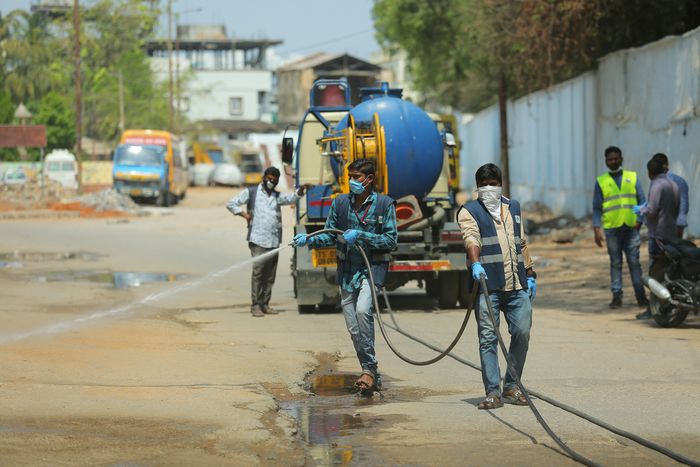The COVID-19 pandemic is a global health emergency that has manifested into a political, humanitarian and ethical crisis of unforeseen proportions. The outbreak of the pandemic in India and subsequent containment measures such as several lockdowns brought the entire economy to a grinding halt. They have highlighted the precarity endemic to the lives of informal workers.
Workers in India's informal sector live from empty hand to mouth in COVID-19 times
To provide insights into this precarity and the coping mechanisms informal workers adopt, ActionAid India is undertaking a national study. The report of the first round of “Workers in the Time of COVID-19” has recently been published. The research was conducted during the third phase of the national lockdown in May 2020. The footage of stranded migrant workers trying to reach their villages on foot was seen around the world and is deeply engraved in the collective memory. The lockdown has deepened the multiple crises being faced by people in the informal economy but has also brought them to light for all to see.
Tourism is one of the sectors in India that employ a large number of informal workers. Most people who work in the informal economy are dependent on petty trade and casual labour. They live in slums, informal settlements, or – as migrant workers in tourist destinations – often at their worksites where they may sleep on the tables or benches in restaurants, or at construction sites. Unlike the formal sector, the informal sector is largely unaccounted for.
The informal sector is characterised by long working hours, low-value, low-paid, and often hazardous work and little to no access to social security. Labour relations are often exploitative. According to the International Labour Organization (ILO), the high incidence of informal working arrangements in the tourism sector is due in part to its seasonality, combined with weak regulation, enforcement and labour organization.
For the ActionAid report we interviewed over 11,530 workers across 21 states. Tourism-related occupations covered included housekeeping, restaurant services, and street vendors. A total of 147 workers (101 male, 46 female) from the hotel sector took part in the interviews, most of them from the South Indian state of Karnataka and the Eastern state of Odisha. The majority were in-situ workers. At the time of interview, 84 percent of them reported jobless.
Outcomes of the study
78 percent of all respondents lost their livelihood and there was a major reduction in the intensity of work. Food and water insecurity emerged as two major problems during the lockdown. Only around 18.5 per cent of respondents said that their food consumption was sufficient. While 63 per cent of respondents were eating two meals a day, 34 per cent said that they could eat only once a day and three per cent reported eating only once in two days. Around 38 per cent of respondents said that their access to water was insufficient or barely sufficient.
60 percent had to vacate their housing, 73 percent could not access public health care when they needed to. Workers have not received much assistance by way of income transfers or wage compensation. The relief that they have been able to access in the form of cooked food, dry rations, and sanitation material etc. has not been enough to sustain them over several weeks of the lockdown. This has forced them to dip into their (often meagre) savings. Close to 58 per cent of them reported that they have borrowed money to meet their expenses during the lockdown.
Lack of written employment contracts
From the total sample of informal sector workers, 90 per cent of the respondents did not have a written employment contract. Out of these respondents, more than half did not receive wages after the lockdown and around 15 per cent received only partial wages. The lack of written contracts makes it extremely difficult to enforce any labour laws.
The effects of the crisis have been so magnified because the shock absorbing capacity of the sector has eroded massively over the years. There has been an intensification of precarious forms of work in both formal and informal sectors of the Indian economy. As the Government has adopted an approach of minimal intervention, firms have increasingly adopted a low-cost strategy. This entails enhancing their price competitiveness by cutting costs and externalizing costs and risks onto workers. One strategy has been to replace regular workers with workers who do not enjoy security of income, employment, insurance among others.
Policy responses needed
Our report has been able to capture only a fraction of the vulnerabilities of informal workers. The objective of the study is not merely to highlight the impacts of the pandemic and the lockdown and push for immediate relief, but also to contribute to broader thinking around frameworks of social and ecological justice. The impacts of COVID-19 on tourism threaten to increase poverty and inequality and to slow down progress towards the Sustainable Development Goals (SDGs).
There needs to be an urgent focus on rebuilding the livelihoods of informal workers. Long term efforts should be centred on creating decent work with dignified minimum wages. There is also a need to improve their working conditions by strengthening and implementing labour laws and creating suitable protective mechanisms. Lastly, all workers must be provided with meaningful social security and affordable and quality public services.
K.T. Suresh is the National Lead – Urban and Labour for ActionAid Association, India. He has worked with Equitable Tourism Options (Equations), a research, campaign, and advocacy organisation focussing on tourism and development issues in India, for 20 years in various capacities and is currently their secretary.



